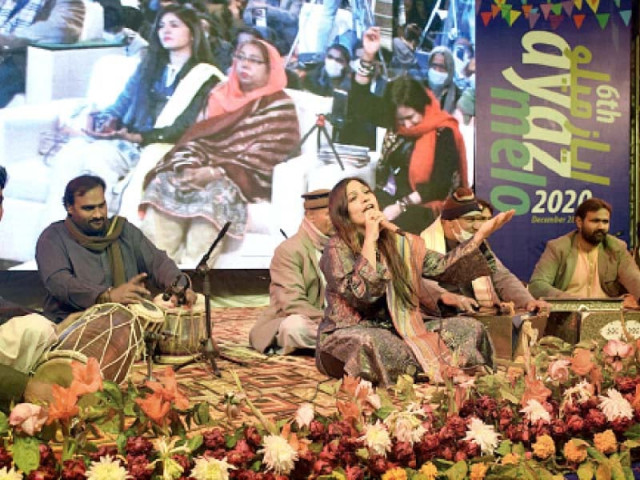Ayaz Melo brings together writers, intellectuals
Concluding day sees discussions on state-people relationship, official history

The eighth annual Ayaz Melo, devoted to the late poet Shaikh Ayaz, which kicked off at Khanabadosh Writers Cafe in Hyderabad on Friday concluded on Sunday, with the event featuring academic and literary sessions, music, and dance.
Pakistan Peoples Party's senior leader and former senator Farhatulla Babur said though the dictators' inserted changes in the 1973 constitution were done away with through the 18th amendment, that 2008 legislation is still awaiting implementation.
He was speaking in the session titled 'new social contract between the state and the people' on the third day of the Ayaz Jo Melo dedicated to famous Sindhi poet Sheikh Ayaz.
"When two successive governments completed five years tenure each, the state began to worry that democracy would take root if that dispensation is allowed to continue," he said.
Babur argued that a hybrid system was put in place in 2018 in the country so that evolution of democracy could be stalled. He recalled that Ayaz was imprisoned because of his opposition to the 1965 war. "The state's tendency is to silence the voices of dissent."
Aslam Khwaja's translated book Pakistan, Mutabadil Tareekh [Pakistan, an alternate history] which was written by Dr Nazir Mahmood, was launched in a session.
Khwaja said the book challenged the state's narrated history and presents the people's history. Dr Zulfiqar Ali Kalhoro's book 'Saints, Sufis and Shrines' was also launched at the festival. The day concluded with a musical night.
Speakers at the inaugural session regarded Ayaz as the poet who professed love for the motherland in his poetry and depicted Sindh as the beloved motherland.
Sindh Culture Minister Syed Sardar Ali Shah said that both Shaikh Ayaz and Shah Abdul Latif Bhitai were universal poets. However, he noted a difference between them: the 18th-century poet Bhitai discouraged the use of other languages like Persian for his poetic expressions, while the 20th-century Ayaz translated only Bhitai's magnum opus, "Shah Jo Risalo", into Persian.
The minister observed that Ayaz's poetry reflects the influences of the colonial period and the migration of Hindus from their homeland, Sindh, to India. Similarly, he added, Bhitai saw the Portuguese invasion of Thatta.
"The fact is Sindh is blessed with three rivers which are Sindhu, Bhitai and Ayaz. And Sindhri is the collective name of these rivers," noted writer Dr. Nasir Abbas Nayyar from Punjab enunciated while reading his paper in the inaugural session, moderated by Amar Sindhu.
Elaborating his notion, he equated the flow of the river with the dissemination of the captivating poetry of Bhitai and Ayaz which have influenced the minds and shaped the personalities of many people. "The Indus gets flows [of water] and poetry of these poets never dries."
Nayyar said that Ayaz was equally well-versed in Urdu, English and Persian languages as in Sindhi with Urdu being the language of his first poetic expressions. Later on, he opted to write in his mother tongue, Sindhi.
Baloch intellectual Shah Mohammad Marri juxtaposed Ayaz with Mir Dad mountain in Balochistan. "Like that mountain, the poetry of Ayaz also has four peaks." He noted that the poet touched on the issues of poverty, starvation, fire, and romance. He recalled that the poet's endeavours were not restricted to poetry alone as he was also a political activist against the One-Unit system and an educationist as well.
Famous writer and playwright Noorul Huda Shah expressed her joy while witnessing the youth dreaming of a new Sindh. "Ayaz is being discussed at melas [festivals] instead of drawing rooms," she said, thanking Sindhu, Arfana Mallah and their friends for organizing the annual event.
TV anchor and journalist Asma Sherazi's book "Kahani Baray Ghar ki" was launched at a separate session. "There was a time when people were put in jails. Today, the thought process has been imprisoned," said Sherazi. She held the people in the power corridors responsible for the adverse experiments in Pakistan.
Published in The Express Tribune, December 26th, 2022.



















COMMENTS
Comments are moderated and generally will be posted if they are on-topic and not abusive.
For more information, please see our Comments FAQ